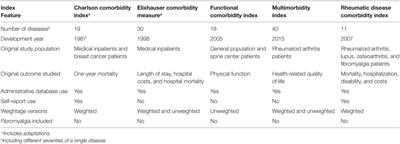EDITORIAL
Published on 03 Jul 2018
Editorial: Comorbidity Burden in Rheumatic Diseases
doi 10.3389/fmed.2018.00197
- 3,149 views
- 14 citations
11k
Total downloads
56k
Total views and downloads
EDITORIAL
Published on 03 Jul 2018
ORIGINAL RESEARCH
Published on 23 Apr 2018

REVIEW
Published on 13 Apr 2018

REVIEW
Published on 12 Mar 2018
ORIGINAL RESEARCH
Published on 19 Feb 2018

REVIEW
Published on 16 Feb 2018

REVIEW
Published on 14 Feb 2018

REVIEW
Published on 08 Feb 2018
